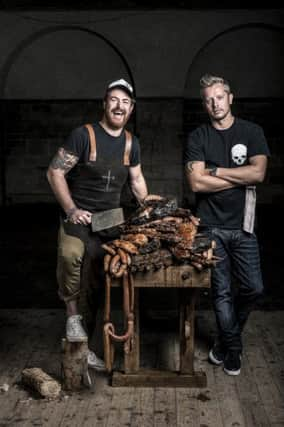Red’s heads to London in multi-million pound expansion


The brand, which opened its first outlet in Leeds city centre in 2012, has grown its turnover to more than £10m since its launch.
So far in 2015, Red’s has invested upwards of £2.2m in opening restaurants in Nottingham and Shoreditch.
Advertisement
Hide AdAdvertisement
Hide AdIt secured £5m investment from a consortium earlier this year, as well as debt funding from Santander Corporate & Commercial.
Craig Bell, finance director at Red’s said the firm had seen significant growth since its launch.
He added: “The Shoreditch restaurant will provide a strong foothold for expansion in London, making Red’s a truly national player.”
Red’s co-founder Scott Munro told The Yorkshire Post that the business is on track to grow to 25 venues in the next four years.
Advertisement
Hide AdAdvertisement
Hide AdHe said: “We’re always looking for sites and research new cities and understand those cities so we can integrate ourselves in a great position.
“We have a UK-wide rollout and expansion plan.” There could also be scope for European openings in future, he said.
Red’s now has two sites in Leeds, including its Headingley outlet, and a restaurant in Manchester, as well as its most recent additions.
It opened its Nottingham store in January this year, while its Shoreditch restaurant will launch this evening.
Advertisement
Hide AdAdvertisement
Hide AdWhile Shoreditch and East London has a large number of barbecue-style restaurants with which Red’s must compete, Mr Munro said the brand’s authenticity will win out. “We focus a huge amount of our time and effort in developing our food and drinks products.
“We have unparalleled investment in that,” he said.
That investment includes the founding of a Pit Master Academy to train up chefs and annual “pilgrimages” to the US.
In these trips, around 10 management and staff visit barbeque restaurants across the Southern states, swapping recipes and learning techniques for “authentic” food, as well as creating content for online marketing.
Mr Munro said: “We don’t have pedigree in this country, but we link into that in the US and feed off it.”
Advertisement
Hide AdAdvertisement
Hide AdThe company is “not going to do anything different” in attempting to crack the London market, he added.
“We want to be true to ourselves and true to our brand,” he said. We create great barbecue in a great environment for our customers. There’s no reason why that shouldn’t work in London.”
Red’s works around three sizes of restaurant, dependent on the location.
Suburban restaurants like Headingley are around 1,500 sq ft with 50 to 60 covers, while Leeds’ city centre venue sits around 110 diners in a 3,000 sq ft site.
Advertisement
Hide AdAdvertisement
Hide AdManchester, Nottingham and Shoreditch are the largest of the brand’s venues, covering more than 5,000 sq ft and accommodating up to 180 seats.
The business invests upwards of £1m in each opening, with the London branch being the most expensive to date, Mr Munro said.
“They’re big sites; we always go for the 80/20 rule,” he said.
“The idea is 80 per cent of the restaurant is different, and 20 per cent is recognisable.
Advertisement
Hide AdAdvertisement
Hide Ad“We always try to push for a slightly different experience in each of our restaurants.”
Last month, Red’s branched out further with the launch a range of sauces and rubs.
The products, which are available exclusively through Asda, are stocked nationwide.
It also released a cookery book, Let There Be Meat.
--
At Red’s True Barbecue, its cooking is not just a type of cuisine, it’s a religion.
Advertisement
Hide AdAdvertisement
Hide AdIts branding plays heavily on religious themes, with customers dubbed “believers” and the menu hailed as “the good book”. But its dedication to meaty fare hasn’t been well-received by all.
Last year, a ‘anti-vegetarianism’ campaign, shared with the hashtag #savetheveggies, drew complaints.
Red’s apologised, saying: “We wanted to do this primarily to entertain our carnivorous customer base, giving vegetarians a playful poke, rattle the easily offended and get a reaction.
“Mission accomplished.”